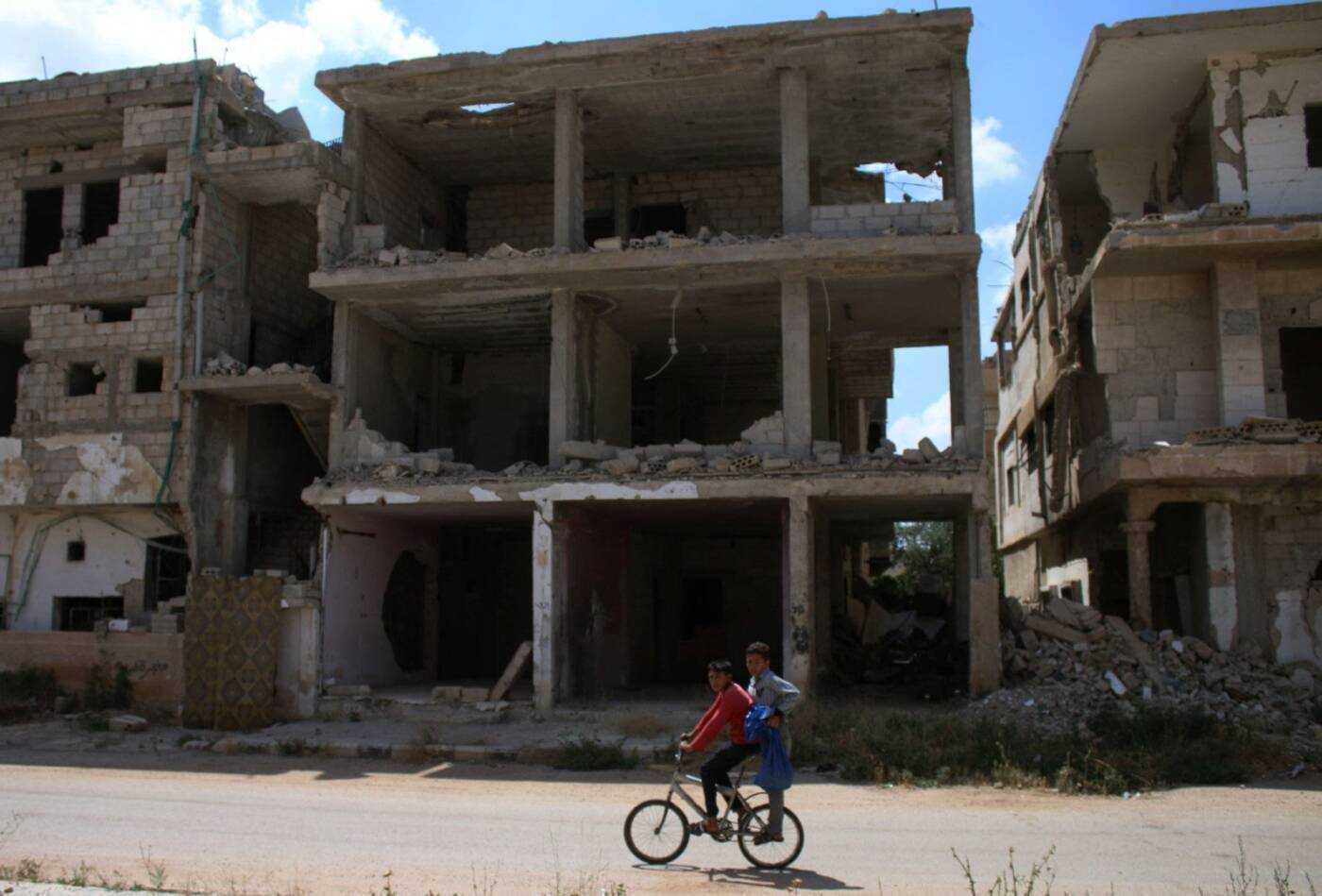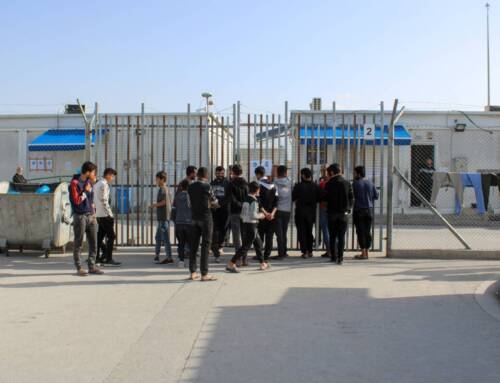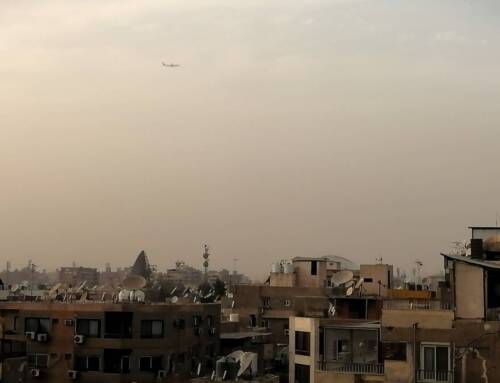Suspended sponsorship programs drive Daraa children into labor market, poverty
Nearly five years after Daraa returned to Damascus’ control, humanitarian organizations that previously sponsored children who lost their parents have not been able to resume their work, leaving children to face extreme poverty or the labor market, leaving school behind.
10 May 2023
PARIS — In late 2019, when he was around 11 years old, Abdulrahman dropped out of school and went to work maintaining motorcycles to support his mother and three brothers. His family was in a difficult financial position, ever since his father was killed by regime shelling of their city, Inkhil, in the north of Syria’s southern Daraa province, in 2015.
Until 2018, Abdulrahman, his siblings and mother were part of a financial sponsorship program run by a local humanitarian organization for children who lost one or both parents. Each month, they received $250: $50 for each member of the family. But when Damascus retook control over southern Syria under a Russian-sponsored settlement agreement with opposition factions in July of that year, the organization supporting his family shuttered its offices and stopped working.
With Damascus back in control, all humanitarian and relief operations carried out by Syrian organizations born in the wake of the Syrian revolution in the spring of 2011 ground to a halt.
When Abdulrahman’s family lost financial support, his mother at first tried to rule out the option of her son working and leaving school. She started to work herself, but her income was not enough. After a year and a half, he too became the breadwinner, working to support his family as the eldest of his brothers, he told Syria Direct.
Before he did, the family exhausted every option and ran through all their savings, until “the deficit got to the point where my mother couldn’t afford the price of a bundle of bread,” Abdulrahman, now 14, said. “That’s when I started working.” He asked not to be identified by his full name for personal reasons.
Abdulrahman’s family is one of around 270 families in Inkhil that, before the 2018 settlement agreement, were part of sponsorship programs due to the loss of a parent, according to Abu Abdulhaq, a former official at a humanitarian organization that ran such sponsorships. He asked not to be identified by name for security reasons, as he still lives in Inkhil.
There are no official or unofficial statistics regarding the number of children who have lost one or both parents in Daraa province. But in 2018, Abu Abdulhaq’s organization supported 1,060 families in the al-Jidour area in the northwest of Daraa province, he told Syria Direct. All of them “lost the financial sponsorships, and were put in a very difficult situation,” he added, noting that the number of families in need has “increased, because of the continuing insecurity and assassinations in the province.”
‘A father and a mother’
On April 15, 2012, Syrian regime security services detained Umm Ahmad’s husband. Twenty days later, he returned as a lifeless body. Since then, the 40-year-old has become “a father and a mother” to her children, supporting the family alongside household tasks, she told Syria Direct from her residence in the northwestern Daraa city of Jassim.
Before the 2018 settlement agreement, Um Ahmad, her 14-year-old daughter and her 12- and 17-year-old sons benefited from a sponsorship program run by a local organization. When the support system stopped, Um Ahmad opened a small clothing shop at her house to cover the family’s monthly expenses.
The business “was not feasible,” she said, and her eldest son had to drop out of school to work two years ago. Today, he works at a store selling fruits and vegetables for a monthly salary of SYP 200,000 ($24 according to the current parallel exchange rate of SYP 8,235 to the dollar).
“Ahmad excelled in his studies, and he aspires to continue his education, but we had to push him to leave school,” his mother said with regret. “He works long, hard hours from six in the morning until six in the evening.”
“He is patient with his hard work, so his brothers can complete their education,” his mother said. Even so, late last year another of Ahmad’s brothers had to enter the labor market.
Um Ahmad’s second-eldest son left school to work at a grocery store for SYP 125,000 ($15) a month. He suffers from “severe malnutrition, which has affected his height, which is no more than 150 centimeters, and his weight, which is 44 kilograms,” the mother said. She worries “his condition will worsen, and stay with him for life.”
Even with two children working, Um Ahmad and her sons are struggling to cover their basic needs. She is trying to “ration the cost of food, drink and basic needs, so that my daughter doesn’t have to leave school,” she said. “She is the family’s last hope.”
The family used to receive $150 in monthly financial assistance, on top of food baskets for children who lost a parent, clothes and other aid. This “provided us with a good life,” Um Ahmad said, while today the family’s total income is around $55.
The minimum cost of living for a family of five in Syria is currently around SYP 3.5 million (approximately $420), while the minimum wage is SYP 92,000 ($11). The average Syrian income is around SYP 125,000 ($15), according to estimates by the Kassioun newspaper affiliated with the People’s Will Party.
Um Yassin, 32, is in a similar situation. Her husband was killed on May 15, 2015 during clashes between regime forces and opposition factions in Daraa, leaving behind his son, two years old at the time, and his wife, then pregnant with their second child.
Um Yassin works as a cleaner at a private kindergarten in Inkhil for SYP 135,000 ($16) a month. It is not enough to live on, leading her to push her son into the labor market when he turned eight. He, like Abdulrahman, now works at a motorcycle maintenance shop in Inkhil, for a monthly salary of SYP 70,000 ($9).
“We could no longer bear the hunger, and my salary is not enough,” Um Yassin said. “I had no other solution but to send my child to work in a hard profession, for an average of nine hours a day.”
For the past several months, Yassin has been suffering from respiratory problems due to motorcycle exhaust and the fumes of the oil and greases used in his work, his mother said. Despite both the mother and son working, and facing fatigue and health problems, their combined income is less than SYP 205,000 ($24.50), a sum that “neither nourishes nor satisfies hunger,” as she put it.
Most months, Um Yassin cannot cover household expenses with the amount the two earn. Often, she covers the shortfall with “assistance from some relatives and honorable people, such as free bread or drinking water, or some in-kind assistance,” she said. One example is “the vegetables that a grocer gives me for free, or for a quarter of the price, because they have withered or are about to rot,” she said. New clothes and toys are only a dream.
Humanitarian action absent
Nearly five years after the Daraa settlement agreement, Damascus has not given the organizations that sponsored children who lost their parents a permit to operate in the south. “Their staff are in great danger due to the threats, security prosecution and detention,” Abu Abdulhaq said.
“According to the government, those organizations contributed to destabilizing the state, so it classifies them and their workers as terrorists,” he added.
Alongside the absence of humanitarian organizations working independently of the regime, individual initiatives and activities are virtually “nonexistent,” Muhammad al-Hassan (a pseudonym), a former humanitarian worker at an aid organization, told Syria Direct. “Workers in this field and donors inside [Syria] fear that the regime will go after them, since some of the families that were receiving aid are the families of opposition activists or perhaps fighters.”
There are “a limited number of sponsorships,” but the donation processes for them are “not systematic and continuous” as they were before 2018, Abu Abdulhaq explained. “Distribution, which is taking place, is done secretly and without documentation, through individuals and not institutions,” he added. “Distributing the sponsorships institutionally would require documentation processes, and activists are afraid of it for fear of being arrested or killed.”
Some donors try to send money to a child’s guardian–a mother, grandfather or grandmother—directly, through foreign money transfers. The process is done without revealing the identity of the civilian activists working in Syria who receive updated information about sponsored children from trusted people in the country, Abu Abdulhaq added.
But in the absence of organized, independent humanitarian work in southern Syria, children in need, including those who have lost parents, are “working in agriculture, standing on roadsides selling fuel or working in popular markets,” Abu Abdulhaq said, while their mothers “work in agriculture or some factories in the area.”
Dreams gone with the wind
For a long time, Abdulrahman’s dream was to complete his studies and become a doctor. But now, after his family’s circumstances drove him to work in motorcycle maintenance instead, his dream has changed. Now it is to own “my own shop,” he said. “Leaving school and changing my dream used to bother me, especially when I’d see my friends wearing clean school clothes, while mine have oil and grease marks.”
He is not the only one whose dreams have changed. Hussam, 16, left school to work at a clothing store in Inkhil city for SYP 290,000 ($35) a month after his father died four years ago. He dreamed of becoming an engineer, which was also his father’s wish for him, but had to give it up. “Circumstances forced me to do that,” he said.
Still a minor, Hussam is trying to step into adulthood, to “compensate my mother and siblings for the loss of my father. I try to provide for them, to take care of them and interact with feelings of joy or sadness towards each of them,” he said. But despite his efforts, he cannot do it all. “The requirements of making a living are beyond my ability,” he said.
Abdulrahman concluded with a question that is always in his mind: “What would my life be like if my father were still alive?”
**
This report was originally published in Arabic and translated into English by Mateo Nelson.







